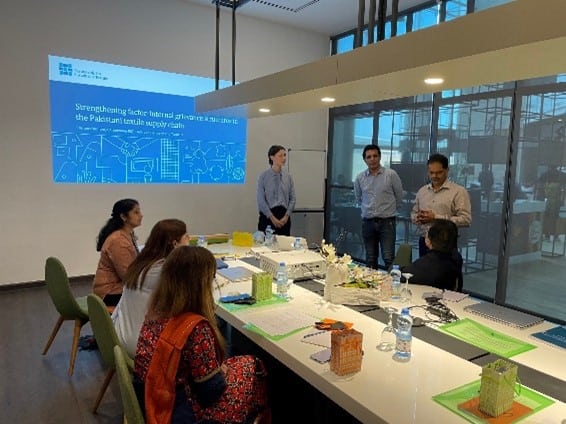Partnership Initiative Complaints Mechanisms: Start of the second module in Pakistan
PI Complaints Mechanisms: Start of the second module in Pakistan
In April 2021 a first module – the opening of the Fair Wear back-up complaints mechanism to PST and AGT members in Vietnam and India – has been started. Together with the Partnership member Fairtrade Deutschland e.V. the Partnership secretariat and secretariat of the Green Button have developed a project for the second module.
The aim of the project is to support suppliers of Partnership and Green Button-licensed companies in setting up or further developing functioning internal complaints structures and to enable management and workers to solve incidents and grievances together in dialogue.
The brands Primark, Hch. Kettelhack, Hugo Boss, Takko and texidea are participating in the project. Another GIZ initiative to improve labour, social and environmental standards in textile industry in Pakistan (TextILES) provides financial and technical support and brings other interested suppliers into the project. A total of about 20 factories are to be supported.
Fairtrade Deutschland e.V. is implementing the project in cooperation with a local team. They draw on the experiences and know-how gathered during the Fairtrade Textile Programme, which has been successfully implemented since 2014 in India and is now being transferred to Pakistan. The Fairtrade Textile Program supports brands in improving working conditions in their textile production facilities. The program covers the areas of occupational health and safety, strengthening workers' rights, living wages and improving efficiency and productivity.
The following measures are planned in Pakistan:
- Sensitisation of management to the needs of employees and training in dealing with received complaints
- Training for workers on their rights and the benefit of complaints mechanisms
- Training on the function and set up of grievance mechanisms for workers and management.
After completion of the project, all suppliers involved should have a transparent complaints procedure in place so that management and employees are able to solve incidents and grievances together.
To kick off the implementation of the project, a training seminar for the local project coordinator and the three Pakistani trainers in charge of the factory trainings was held in Dubai at the end of March 2022. It was conducted by the Fairtrade trainers who implement the Fairtrade Textile Programme in India. The aim was to transfer the relevant contents of the Programme to the Pakistani context, to pass on background information as well as to discuss learning experiences. In addition, the further steps of the implementation were developed.


Background: Textile industry in Pakistan
The textile and garment sector is Pakistan’s most important branch of the manufacturing industry. Some 15 million people (around 38 per cent of the total workforce) work in the textile sector, of which approx. 70% are male.
The working conditions in the textile industry in Pakistan are characterised by poor workplace safety, low wages, as well as a lack of co-determination at company level and a lack of dialogue between management, workers and state institutions.
Further information on the partnership initiative and the modules can be found here.


